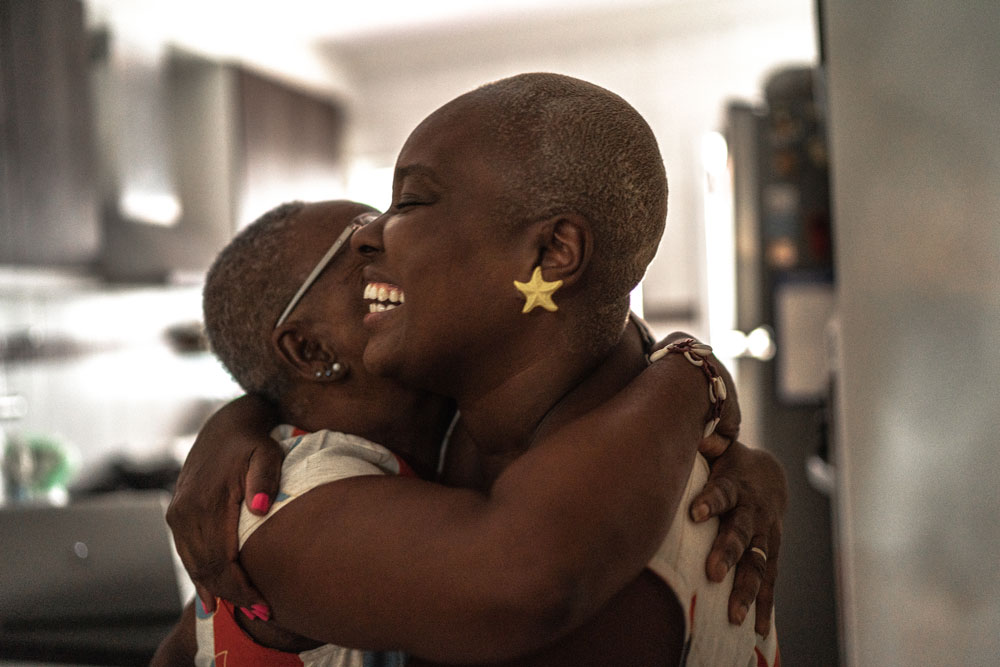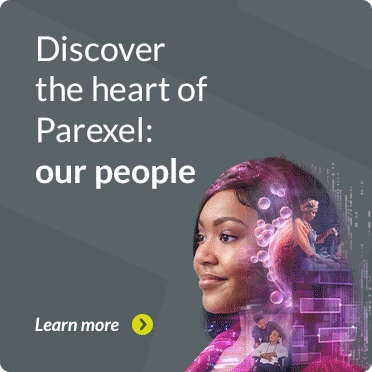Maximize your trial’s impact with continuous quality control
Enormous advances in the understanding of how the brain works and development of treatment modalities are cause for great hope for millions of people affected by neurological disorders. As a neuroscience CRO, Parexel is at the forefront of clinical research in neuroscience where much of the work of accelerating breakthroughs actually happens. Working with biotech and large enterprises worldwide, with a division dedicated to emerging companies, we cover all indications across neurology and psychiatry with a laser focus on operational excellence. Executing trials with precision and impeccable quality is fundamental to bringing new therapies to those who urgently need them.
Achieve your goals with our full-coverage neuroscience practice
Neuroscience trials require close collaboration between our team, your team, and trial sites to deliver on your goals. Our team brings dedication and passion to that collaboration, with deep experience and personal commitment that drives flawless execution. We assign resources with experience in the specific indication to every project. Close adherence to the strategic plan, the flexibility to adapt, continuous communications, and proactive problem resolution are key elements to controlling timelines and budget. Underpinning these capabilities are the technology tools embedded in our practice that enable early detection, trial monitoring, risk mitigation, and support for physicians (raters) who run assessments during the trial. We design and deliver studies that ensure patient safety, data integrity, regulatory compliance, and scientific rigor.
For our customers focused on advancing the science and developing treatments, we amplify their work with real-world alliances and established relationships with sites, investigators, and patients worldwide. There is no substitute for the breadth of our reach and the depth of our expertise as a large CRO.
I'm very proud of my team. To see the talents, the expertise, medical directors with diverse backgrounds, different experience in academia, clinical practice, the industry all over the around the world, experts in different neurology and psychiatry indications they know clinical development very, very well. They are doing it for the patients and we are all patients at some point. So that's very important.
We are entering a new era when it comes to neuroscience. We've seen that with recent approvals of treatments in indications where for many years we were facing failures and disappointments. Scientists through research, hard work, efforts, understand better today the mechanisms of some of the diseases and therefore they find good ways to address the problem. So I think that's one important part of why neuroscience is very exciting nowadays.
The other is the patient's voice. Patients today are important stakeholders around the table. They are decision makers. They influence research, they influence the pathway of approvals and access to treatment. I think this is extremely important. But we have still some distance to cover, so we want them to be more active. We want them to be real partners because these are treatments for them.
Another point is that we're entering this era of addressing how to repair the damage and also how to discover diseases very early. So early diagnostics, the role of biomarkers and how to move towards precision medicine and prevention are really very important questions for neuroscience, because for many of these diseases, the moment that somebody gets symptoms equals many of the cells that are affected are already gone, so it's too late.
So we need to address this important need of discovering diseases early. Examining the general population and also maybe being more preventive than treating the disease when it's too late. When I think neuroscience at Parexel, I know that we are the reference for sponsors for difficult problems to solve. Alzheimer's, Parkinson's, multiple sclerosis, depression. These are key priorities for the world because there are great unmet needs there.
Experience in the past 5 years with neuroscience
clinical and consulting projects
enrolled patients
active unique sites
Indications
Psychiatry
Psychiatry focuses on diseases characterized by alterations in mood, behavior, cognition and perception — like schizophrenia, major depressive disorder, bipolar disorder, anxiety disorders, and post-traumatic stress disorder. Our experience includes the use of novel treatments targeting important unmet medical needs, such as negative and cognitive symptoms in schizophrenia, treatment-resistant depression, and studies in both acutely ill and stable patient populations.
Our board-certified psychiatrists, in collaboration with biostatisticians and regulatory experts, are always ready to engage in study design optimization, methods to reduce placebo effect, and clinical development strategy. We also improve the interpretability of results by focusing on rater training, instream monitoring of data quality and study conduct, and risk mitigation strategies.
Neurology
Neurology focuses on the diagnosis and treatment of diseases and disorders of the nervous system, which includes the brain, spinal cord, peripheral nerves, and muscles. Our experience includes a wide range of neurological conditions, such as epilepsy, Alzheimer's disease, Parkinson's disease, traumatic brain injury, and others.
Parexel's approach to neurology research combines scientific rigor, collaboration, patient-centricity, advanced technologies, and global reach to drive innovation and accelerate the development of breakthrough therapies for neurological disorders.
Our experts in neuroscience
Andreas Lysandropoulos, M.D., Ph.D.
Senior Vice President, Global Therapeutic Area Head, Neuroscience
Antal János, M.D., M.B.A.
Vice President, Global TA Section Head Neurology
Karla Kanis, M.D.
Vice President, Global TA Section Head Neurology
Mohit Verma, M.D.
Global Section Head, Psychiatry
Mwango Kashoki, M.D., M.P.H.
Senior Vice President, Global Head of Regulatory Strategy
Simona Stankeviciute, M.D., M.Sc.
Vice President, Technical
Our experts in neuroscience
Andreas Lysandropoulos, M.D., Ph.D.
Senior Vice President, Global Therapeutic Area Head, Neuroscience
Antal János, M.D., M.B.A.
Vice President, Global TA Section Head Neurology
Karla Kanis, M.D.
Vice President, Global TA Section Head Neurology
Mohit Verma, M.D.
Global Section Head, Psychiatry
Mwango Kashoki, M.D., M.P.H.
Senior Vice President, Global Head of Regulatory Strategy
Advantages
Trial designs for any indication
Our expertise in study design includes pediatric and adult, common and rare disease, shorter-term studies to evaluate symptomatic treatments, and longer-term studies to assess for disease modification. We bring expertise in adaptive designs, the use of external control arms, and the use of real-world evidence. We’re also well versed in state-of-the-art biomarkers, diagnostic adjudication, and signal detection strategies.
Seamless support across neuroscience drug development
We’ll provide support for any stage of your project, from hospital-based first-in-human studies to proof of concept; from dose-finding to Phase III confirmatory studies; and from long-term safety and post-marketing study commitments, to indication expansion. We have the experience and expertise to drive your research forward.
Extensive psychiatric & neurological capabilities
Our psychiatry and neurology clinical expertise includes capabilities like the continuous collection of cerebrospinal fluid for sampling, neuropsychological testing, and evaluation, and use of biomarkers and imaging for diagnosis and outcomes. We also offer comprehensive neuropsychological evaluations across the spectrum of cognitive aging.
related insights
Webinar
Incorporating the Patient Voice: How Patient Insights Drive Trial Design and Outcome Measures in Schizophrenia Research
Oct 30, 2024
Report
New Medicines, Novel Insights: Accelerating the new frontiers in neuroscience
Oct 29, 2024
Report
New Medicines, Novel Insights: Accelerating the new frontiers in neuroscience
Oct 29, 2024
Report
New Medicines, Novel Insights: Accelerating the new frontiers in neuroscience
Oct 28, 2024
Blog
Parkinson’s Disease Patient Advocacy Q&A
Sep 18, 2024
Webinar
Alzheimer’s Disease vs Multiple Sclerosis Drug Development: Similarities, Differences & New Perspectives
Aug 22, 2024
Podcast
Enabling Successful Sites, Episode 2: Empowering Sites to be More Inclusive Through Cultural Sensitivity Training
Jun 28, 2024
Podcast
De-risking Drug Development | Episode 1: How to drive value in pre-clinical development
May 28, 2024
Blog
Deriving meaningful insights from real-world data for diverse Alzheimer’s research studies
Mar 19, 2024
Blog
Opportunities and strategies for accelerating patient access to treatments for Alzheimer’s disease
Feb 23, 2024
Blog
As more neuroscience drugs are approved, the value proposition takes center stage
Feb 14, 2024
Blog
How sponsors can make it easier for rare disease patients and families to participate in trials
Feb 13, 2024
Blog
How we can bring gene therapies to bear on diseases of aging
Jan 31, 2024
Blog
Increasing trial participation and population diversity in early-phase Alzheimer’s disease drug development
Jan 24, 2024
Blog
Improving and accelerating clinical research in dementia by integrating the patient’s voice throughout the development journey
Jan 24, 2024
Blog
Regulatory considerations in designing clinical trials for Alzheimer’s disease
Jan 24, 2024
Blog
Building a program for patient-guided clinical research for Alzheimer’s disease
Jan 24, 2024
Blog
Newly released FDA data and approvals signal a more welcoming regulatory environment for neuroscience clinical trials
Oct 3, 2023
Blog
New CNS Franchise Leader brings experience from pharma and as a clinician and researcher
Nov 14, 2022
Article
Relyvrio Approval: Lessons Learned
Oct 31, 2022
related insights
Webinar
Incorporating the Patient Voice: How Patient Insights Drive Trial Design and Outcome Measures in Schizophrenia Research
Oct 30, 2024
Report
New Medicines, Novel Insights: Accelerating the new frontiers in neuroscience
Oct 29, 2024
Report
New Medicines, Novel Insights: Accelerating the new frontiers in neuroscience
Oct 29, 2024
Report
New Medicines, Novel Insights: Accelerating the new frontiers in neuroscience
Oct 28, 2024
Blog
Parkinson’s Disease Patient Advocacy Q&A
Sep 18, 2024
Webinar
Alzheimer’s Disease vs Multiple Sclerosis Drug Development: Similarities, Differences & New Perspectives
Aug 22, 2024
Podcast
Enabling Successful Sites, Episode 2: Empowering Sites to be More Inclusive Through Cultural Sensitivity Training
Jun 28, 2024
Podcast
De-risking Drug Development | Episode 1: How to drive value in pre-clinical development
May 28, 2024
Blog
Deriving meaningful insights from real-world data for diverse Alzheimer’s research studies
Mar 19, 2024
Blog
Opportunities and strategies for accelerating patient access to treatments for Alzheimer’s disease
Feb 23, 2024
Blog
As more neuroscience drugs are approved, the value proposition takes center stage
Feb 14, 2024
Blog
How sponsors can make it easier for rare disease patients and families to participate in trials
Feb 13, 2024
Blog
How we can bring gene therapies to bear on diseases of aging
Jan 31, 2024
Blog
Increasing trial participation and population diversity in early-phase Alzheimer’s disease drug development
Jan 24, 2024
Blog
Improving and accelerating clinical research in dementia by integrating the patient’s voice throughout the development journey
Jan 24, 2024
Blog
Regulatory considerations in designing clinical trials for Alzheimer’s disease
Jan 24, 2024
Blog
Building a program for patient-guided clinical research for Alzheimer’s disease
Jan 24, 2024
Blog
Newly released FDA data and approvals signal a more welcoming regulatory environment for neuroscience clinical trials
Oct 3, 2023
Blog
New CNS Franchise Leader brings experience from pharma and as a clinician and researcher
Nov 14, 2022
Article
Relyvrio Approval: Lessons Learned
Oct 31, 2022
Frequently asked questions
Common neuroscience CRO services encompass a wide range of specialized offerings designed to support pharmaceutical and biotech companies in their neuroscience-related clinical trials and drug development efforts. These services typically include study design and protocol development, tailored specifically to the complexities of neurological and psychiatric disorders. Patient recruitment and retention strategies are crucial, given the often-challenging nature of finding suitable participants for neuroscience studies. Site selection and management are also key services, as neuroscience trials often require specialized facilities and expertise.
Additionally, neuroscience CROs provide advanced data management and analysis, incorporating the latest techniques in neuroimaging and biomarker assessment. They offer regulatory affairs support, helping navigate the complex landscape of neuroscience drug approvals. Specialized services may include cognitive testing, neurophysiological assessments, and the development and validation of novel biomarkers. Many neuroscience CROs also provide pharmacovigilance services and support in post-marketing surveillance, which are critical in the neuroscience field due to the potential for long-term effects of neurological and psychiatric treatments.
Partnering with a neuroscience CRO for clinical trials can be highly beneficial for pharmaceutical and biotech companies. Neuroscience CROs offer specialized expertise and experience in the complex field of neurological and psychiatric research, which can significantly enhance the quality and efficiency of clinical trials. These organizations have in-depth knowledge of neurological disorders, cutting-edge assessment techniques, and the latest regulatory requirements specific to neuroscience studies. This expertise can lead to more robust study designs, more effective patient recruitment strategies, and more accurate data analysis, potentially increasing the chances of trial success.
Furthermore, neuroscience CROs often have established networks of investigators and research sites specializing in neurological and psychiatric disorders. This can expedite patient recruitment and ensure high-quality data collection. They also typically have access to advanced technologies and methodologies specific to neuroscience research, such as neuroimaging techniques and cognitive testing tools. By leveraging these resources and expertise, pharmaceutical companies can potentially reduce the time and cost associated with clinical trials, while also improving the overall quality of their research. This partnership can be particularly valuable for companies that may not have extensive in-house neuroscience capabilities or for those looking to supplement their existing resources.
Essential neuroscience CRO services for successful clinical trials encompass several key areas. First and foremost is expert study design and protocol development, which is crucial given the complexity of neurological and psychiatric disorders. This includes the selection of appropriate endpoints, patient populations, and assessment tools specific to the neuroscience field. Patient recruitment and retention strategies are also vital, as neuroscience trials often face challenges in finding suitable participants and maintaining their engagement throughout the study. Additionally, specialized data management and analysis services are essential, incorporating advanced techniques for handling complex neuroimaging data, biomarker assessments, and cognitive test results.
Another critical service is regulatory affairs support, which helps navigate the intricate regulatory landscape specific to neuroscience therapies. This includes assistance with regulatory submissions and ensuring compliance with evolving requirements. Site selection and management are also crucial, as neuroscience trials often require specialized facilities and expertise. Furthermore, pharmacovigilance services are essential for monitoring and managing the safety profiles of investigational neuroscience therapies. Lastly, many successful trials benefit from CROs that offer expertise in biomarker development and validation, as well as advanced neurophysiological and cognitive assessments, which can provide valuable insights into drug efficacy and mechanism of action.
Neuroscience CRO services can indeed play a crucial role in navigating regulatory challenges in drug development. These specialized CROs possess in-depth knowledge of the regulatory landscape specific to neuroscience therapies, which is particularly complex due to the intricate nature of neurological and psychiatric disorders. They can provide valuable guidance on regulatory strategy, helping sponsors understand and anticipate regulatory requirements from agencies such as the FDA, EMA, and others. This expertise extends to assisting with the preparation and submission of regulatory documents, including Investigational New Drug (IND) applications, New Drug Applications (NDAs), and marketing authorization applications.
Furthermore, neuroscience CROs can help sponsors stay abreast of evolving regulatory requirements and guidelines specific to neuroscience therapies. They can provide support in designing clinical trials that meet regulatory expectations, including the selection of appropriate endpoints and assessment tools that are acceptable to regulatory authorities. In cases where novel biomarkers or innovative trial designs are being used, these CROs can facilitate discussions with regulatory agencies to ensure alignment. Additionally, they can assist in addressing regulatory queries and managing post-approval commitments. By leveraging the regulatory expertise of neuroscience CROs, drug developers can potentially streamline the approval process, mitigate regulatory risks, and increase the likelihood of successful market authorization for their neuroscience therapies.







